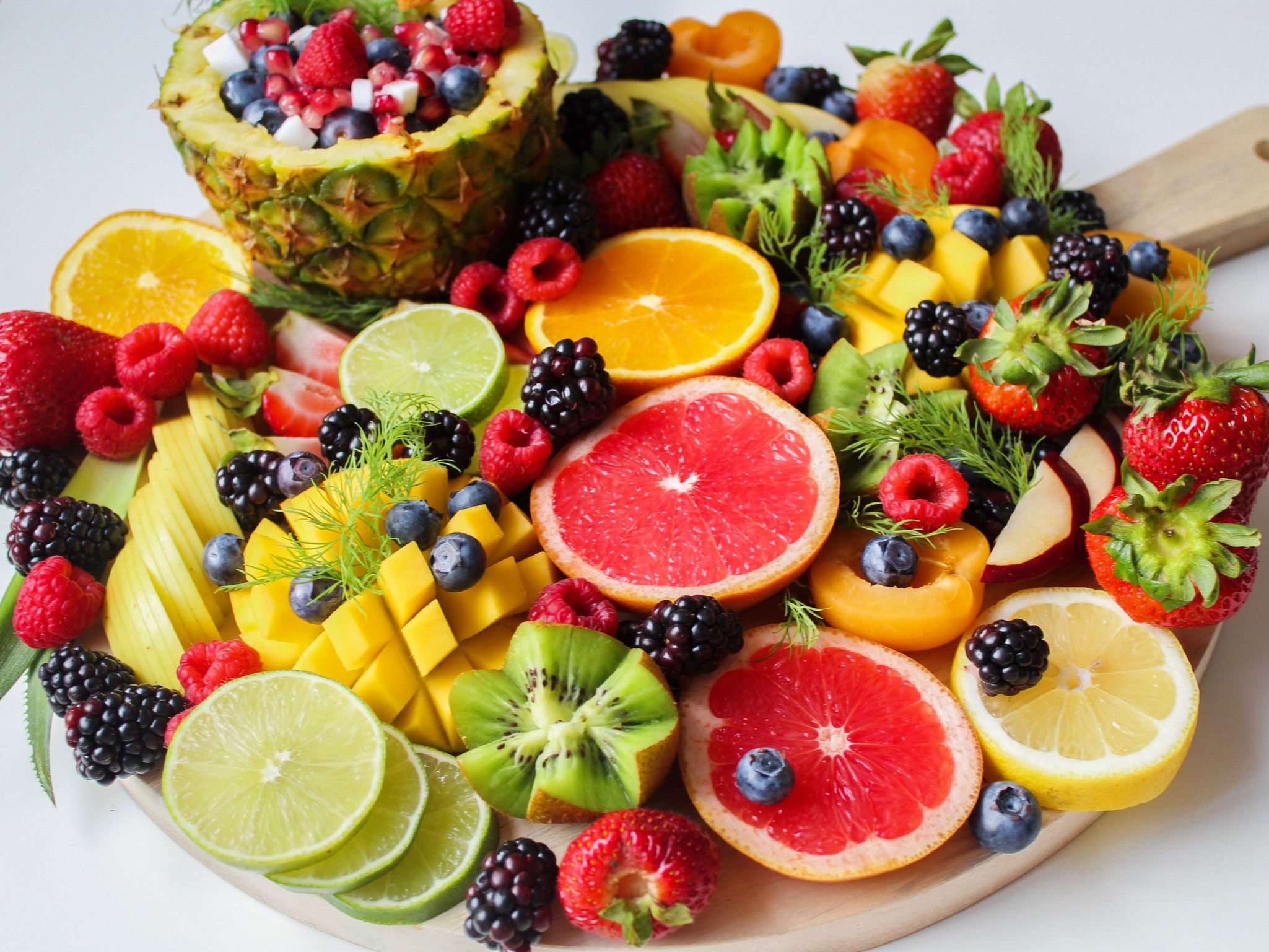We often hear that fruit, along with vegetables, whole unprocessed foods, organic protein, and healthy fats, is a key component of a healthy diet. After all, fruit has beneficial soluble and insoluble fiber, immune-boosting antioxidants, and valuable vitamins and minerals. Why, then, do some people avoid certain fruits, eat them without other foods or only at certain times of day, or steer away from fruit altogether?
Not All Fruits Are Created Equal When it Comes to Sugar Content
The amount of sugar varies widely depending on the fruit. Mangoes, cherries, figs, bananas, pears, and dried fruits are among the highest. Lemons and limes, all types of berries, melon, stone fruit like peaches and plums, and kiwi are among the lowest. Fructose, the sugar found in fruit sugar, is metabolized differently compared to sugars that contain glucose such as those in starchy carbs, sweets, and dairy products. However, all types of sugar intake raise blood sugar and insulin levels which can lead to excess fat storage. These factors are particularly relevant for diabetic blood sugar control, weight management, and overall health.
Recommendation: limit quantities of high sugar fruits and choose lower sugar fruits more often.
Should Fruit Be Eaten Alone Or At Certain Times Of The Day?
There are a lot of myths about fruit as it relates to digestion and nutrient absorption. For example, that fruit should be eaten alone so it doesn’t ferment in the gut while the body is digesting other foods. Another related myth is that the body maximizes digestion and absorption of the fruit’s valuable nutrients if eaten alone. Yet another myth is that fruit should be used as a morning pick-me-up but not eaten in the afternoon or evening otherwise the resultant blood sugar spikes won’t subside by bed time and could lead to weight gain.
None of these scenarios are true: the stomach’s acid content prevents bacterial fermentation of ingested fruit, and anyway, food moves along quickly in the stomach and won’t linger long enough to ferment, even if the fiber in fruit, called pectin, minimally decreases the stomach emptying time. Furthermore, the body is able to digest and absorb all nutrients consumed and by the time it’s in your stomach and beyond, the foods are mixed and digested en masse.
Any food that provides sustenance can feel like an energy boost, especially after a period of fasting, such as overnight, and unless someone is diabetic, the body very quickly brings the blood sugar back to a healthy range at any time of day. Fruit itself doesn’t cause weight gain.Weight regulation is highly complex and depends on factors such as the nutritional value of foods consumed, quantities eaten, the health of the gut biome, and individual metabolism and body composition.
Recommendation: Pay attention and respond to your appetite and cravings, notice the impact of your fruit consumption patterns, and enjoy eating fruit accordingly.
Is There Such a Thing As a “Fiery” Gut?
The Ayurvedic diet, an approach to eating based on a Hindu system of medicine, focuses on whole foods that maintain and increase an individual’s life energy force. In addition to its focus on whole foods and mindfulness, one of the principles is avoiding or minimizing cold foods and beverages as well as sweet foods eaten. The reason is that the Ayurvedic tradition characterizes digestion as a “hot” and fiery process and that cold and sweet foods, like chilled or frozen fruit, can dampen the digestive energy.
In theory, this makes sense, for example, when consuming oils. At body temperature, most fats are in liquid form. If you add ice water to the digestive process, perhaps the liquid oils will solidify, not be as easily digested, and cause indigestion. Whether this actually happens is unclear. But for me, visualization of congealed fats in my stomach and intestines is enough to prevent me from drinking iced beverages at mealtime. However, it may be a complete non-issue for you!
If consumed at all, the Ayurvedic tradition recommends consuming fresh and dried fruits in small quantities at room temperature and to choose low sugar fruits. Fruits can be consumed as a minor cooking ingredient, for example, in oatmeal, soups, and casseroles. As a note, many other traditional cuisines also avoid cool foods, especially at meals. For example, hot tea, and not ice water, is featured during Chinese meals, with sweet foods consumed at a minimum.
Recommendation: Experiment with adding and eliminating fruit in your diet, and notice if eating fruits at cool or frozen temperatures affects your digestion and energy levels.
The Bottom Line
As with many nutrition guidelines, it’s important to consider your overall eating habits. Vegetables in general offer a wider range of nutrients, more fiber, phytochemicals, and a lower sugar load for your body compared to fruit. Fruit, especially low sugar varieties, certainly offers health benefits. And if fruit consumption means you’re eating fewer baked goods or processed foods than you would if you were not eating fruit, you’re in good shape when it comes to health and feeling your best. Moderation, variety, and high quality whole organic foods – and how you feel – remain your best nutrition guidelines of all.


Thank you for the discussion of fruit and sugar and timing. I’ll look for berries, peaches, and plums on my next shopping day. My Chinese parents were little interested in cold drinks or ice cubes. Now I have a name to give to this Ayurvedic tradition
I have great respect for traditions, like the Chinese cuisine, which has been perfected over many centuries and it’s certainly validating when those traditions are still relevant today. Thank you for your comments. I hope the recommended fruits truly help you feeling your best!